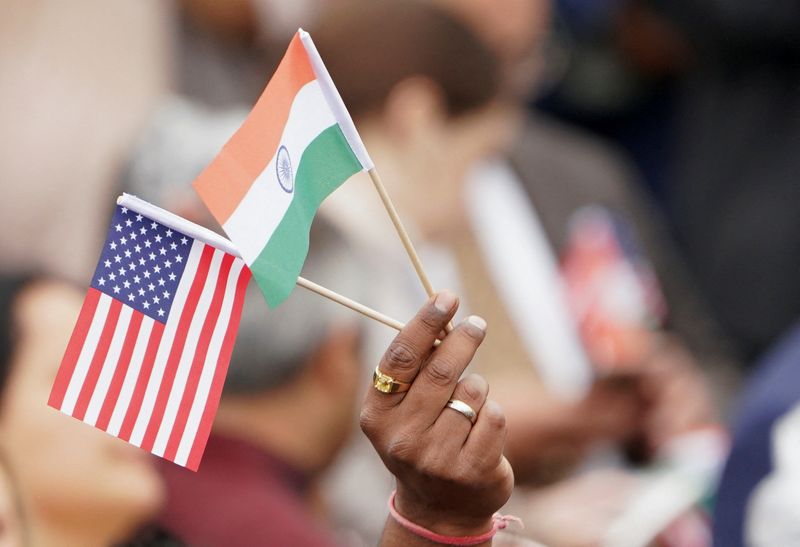By Manoj Kumar
NEW DELHI (Reuters) - India is preparing for possible trade talks with the United States, aiming for increased investments from U.S. companies and higher exports once President-elect Donald Trump takes office.
While aiming to protect its manufacturers from potential U.S. tariff hikes on its exports, India is exploring ways to strengthen ties with Washington as Trump has threatened tariffs of 60% and other curbs on imports from China.
Here are key commercial issues between the two countries:
TRUMP POLICY ON CHINA
India seeks to leverage Trump's policy by capitalising on U.S. trade tension with China, aiming to draw away from it investments and businesses diversifying supply chains.
To align with Trump’s "America First" policy, India is ready to offer more incentives such as tax cuts and land access in states like Andhra Pradesh, Gujarat and Tamil Nadu in industries such as semiconductors, electronics, aircraft parts, and renewables.
India also seeks to integrate into U.S. global supply chains by supplying low-end and intermediate products, from chips and solar panels to machinery and pharmaceuticals.
ENERGY AND SECURITY
To tackle U.S. concerns on trade imbalances, India is open to increasing imports of energy products, such as LNG, and defence equipment while retaining its independent foreign and trade policies.
Discussions on co-producing General Electric (NYSE: GE )'s, fighter jet engines by state-run Hindustan Aeronautics in India, have made little progress.
But India hopes the two countries' 2023 defence industrial co-operation roadmap will fast-track technology sharing and co-production initiatives.
BROADER TRADE-CUM-INVESTMENT PACT
The government and industry groups favour a broader trade and investment pact with the United States to help Indian manufacturers integrate into global supply chains while retaining policy flexibility to safeguard national interests.
BOOST TO EXPORTS
In return, India seeks to increase exports in pharmaceuticals, garments, footwear, engineering goods, chemicals, areas where it has a growing comparative advantage over China.
AIMING FOR U.S. INVESTMENTS
India is targeting greater U.S. investments, inspired by Apple Inc (NASDAQ: AAPL ) starting production of iPhones in the country. India hopes to lure more companies into manufacturing by offering incentives, streamlined regulatory approvals, and affordable land.
The United States is already India’s third-largest investor, with $65 billion in direct investments from 2000 to 2023.
SELECTIVE TARIFF CONCESSIONS
Advisers have suggested considering selective tariff cuts on items such as pork and Harley-Davidson (NYSE: HOG ) motorcycles, which have limited domestic demand. Broader concessions could be negotiated in exchange for gains such as more visas for Indian professionals and export-boosting investments.
TWO-WAY TRADE

Two-way trade between India and the United States, India’s largest trading partner, surpassed $118 billion in 2023/24, with India posting a trade surplus of $32 billion.
Industry estimates suggest trade could grow by $50 billion within two to three years, highlighting the growth potential for stronger economic ties.

